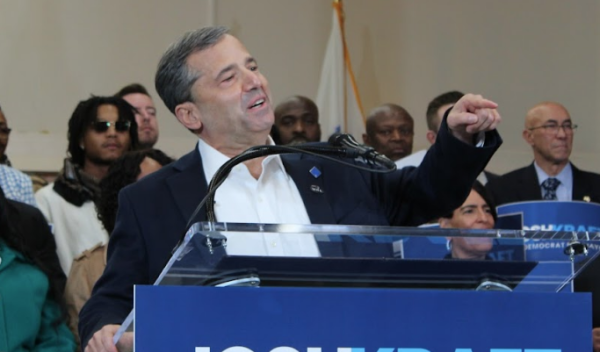February 12, 2025

Josh Kraft spoke during a campaign launch event in Grove Hall last week. Cassidy McNeeley photo

Mayor Wu calls ‘opt-in’ rent control idea ‘fake’
Mayoral challenger Josh Kraft released new details about his positions on housing “access and affordability” this morning in the first in-depth policy disclosure of his still-emerging campaign. The plan drew a sharp rebuke from Mayor Wu, who called Kraft's idea for a voluntary version of rent control "fake," and said his real aim is to "dismantle" affordable housing programs in the city.
Notably, Kraft says he would unwind a Wu administration policy that increased the number of affordable units that developers are required to build— or provide offsite funding for— and return to a lower threshold that existed under Mayor Marty Walsh’s tenure.
Kraft’s plan doubles-down on a critique he made of Mayor Wu when he announced his intention to run last week: That her housing policy is not producing enough new units to meet demand in the city.
“On the number one challenge facing our residents—access to housing that regular people can afford—production under Mayor Wu has ground to a halt,” said Kraft. “Having so many permitted projects continue to sit on the shelf generates no new housing, no new jobs, and no new tax revenue. My plan will change that.”
Kraft’s campaign said today that he would change the current “inclusionary development policy” (IDP) formula, which is used to mandate the number of affordable units created in large building projects in the city. Mayor Wu’s administration has gradually increased the required number of affordable units needed per project to 20 percent, up from 13 percent in the Walsh administration. Kraft claims that the IDP change has slowed the number of housing starts.
The proposal unveiled today also introduces an “opt-in” form of rent control that Kraft argues would be more effective than Mayor Wu’s strategy of formalizing rent reforms through the state Legislature.
“My plan is completely voluntary, would benefit both tenants and building owners, and would not require approval from the state legislature,” Kraft said in a statement. “Renters deserve to be protected from massive year-over-year increases, and my plan will do that.”
Kraft’s program would target new developers and buildings under six units, including three-story homes.
Specifically, he plans to ask landlords to cap their rents at the Consumer Price Index (CPPI) plus 5 percent, not to exceed 10 percent per year, over ten years. Property owners who participate, he says, will be offered a 20 percent “return” on real estate taxes.
The plan, Kraft‘s campaign says, will target relief for “workforce” tenants by only allowing renters who earn below 200 percent of AMI to participate.
In a statement announcing the plan on Wednesday, the Kraft campaign claims that more than 26,000 units that have already been approved and are ready to build “are not financially viable.”
The campaign blames “Wu Administration’s mandates,” but does not note that other factors— including higher interest rates and mounting costs for construction materials and labor, may also be contributing factors.
In her first public comments reacting to Kraft’s proposal, Mayor Wu used the term “fake” to characterize the rent control element of the Kraft plan— and called it a “distraction” from the “real proposal [which] is to dismantle affordability requirements and take us back to when it was anything goes for developers.”
Speaking on GBH’s Boston Public Radio on Wednesday morning, Wu noted that up to 30,000 units of housing already approved and permitted in the city are not subject to increased IDP regulations because they were approved before the formula was changed.
“This is a total misunderstanding of the reality of the city’s work,” Wu said. “This would take us backwards.”
Kraft announced his intention to challenge Mayor Wu during a rally and press conference in Grove Hall last week.
People seeking to run for office in the city of Boston this year are not officially candidates until they collect nomination signatures and get certified by city election officials and the Secretary of State’s office in a process that starts in April.
Topics:


